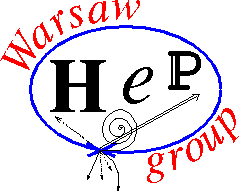SEMINARIUM FIZYKI WIELKICH ENERGII
Dnia 03 czerwca (piątek) o godzinie 10:15, w sali B2.38 odbędzie się
seminarium, na którym zostanie wygłoszony referat pt.:
„New description of neutrino flavour evolution in solar matter — oscillations or no oscillations?”
Referuje: Prof. dr hab. Jacek Ciborowski
Abstract:
During the seminar I will present new analysis performed with ZEUS data on exclusive Assuming that the interacting neutrino and the solar matter can be treated as an open quantum system we formulate a formalism of neutrino state evolution according to a quasilinear extension of the von Neumann equation. We broaden the classical linear Wolfenstein formalism (MSW effect) by means of reinterpreting the results in terms of the quantities appropriate for the quasilinear approach. We show that the dynamics of the neutrino evolution („flavour conversion”) is effectively governed by the distance of the evolving system to the structural instability point of the evolution equation. We obtain similar predictions for the averaged neutrino survival probability measured on Earth in both approaches, differing inside the Sun where the quasilinear evolution predicts a suppression of oscillations. A nonzero mean energy transfer between the neutrino and the Sun supports the initial assumption. We also discuss the speed of the state evolution in both approaches. Ways to test on Earth the quasilinear hypothesis will be mentioned.
Serdecznie zapraszamy
dr hab. Katarzyna Grzelak
prof. dr hab. Jan Królikowski
prof. dr hab. Aleksander Filip Żarnecki

